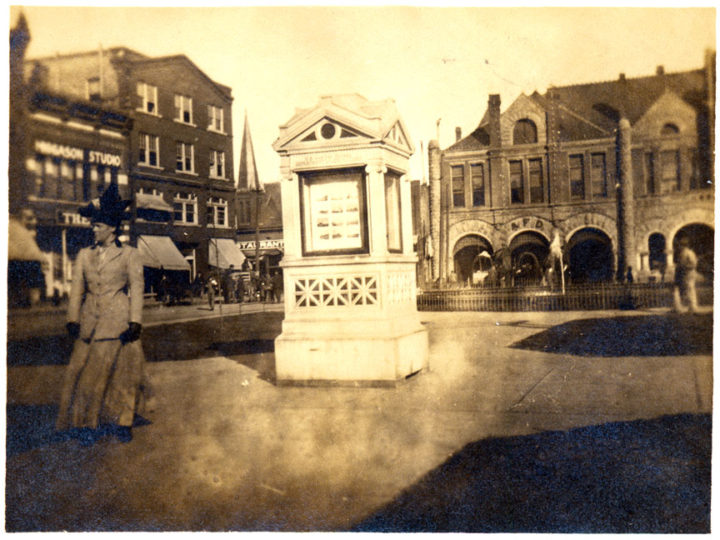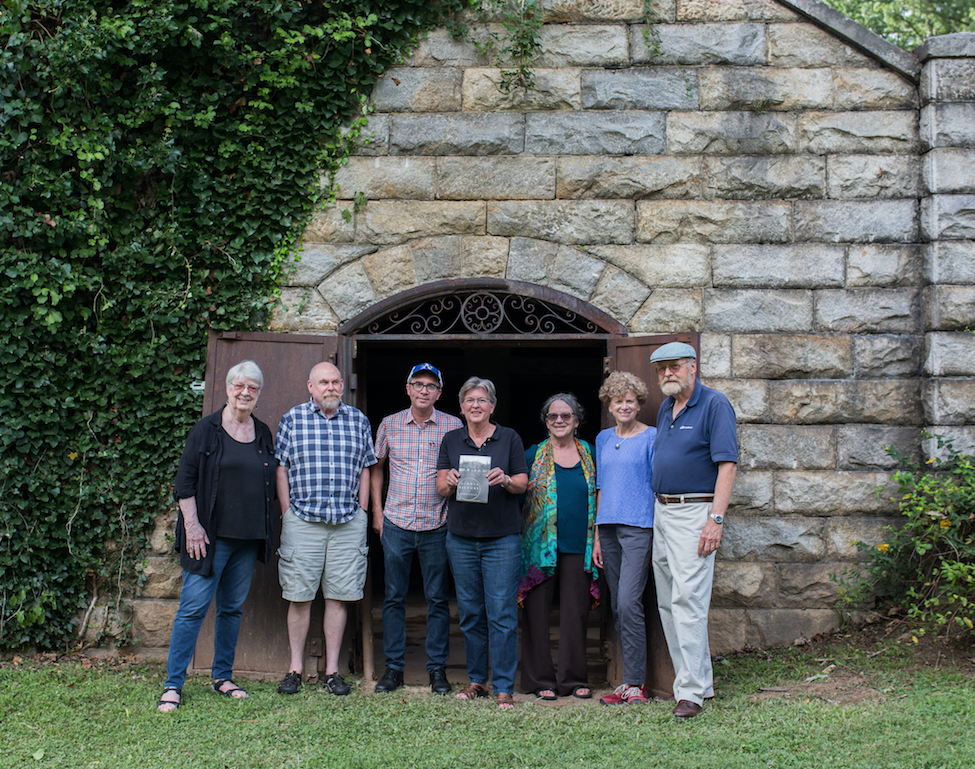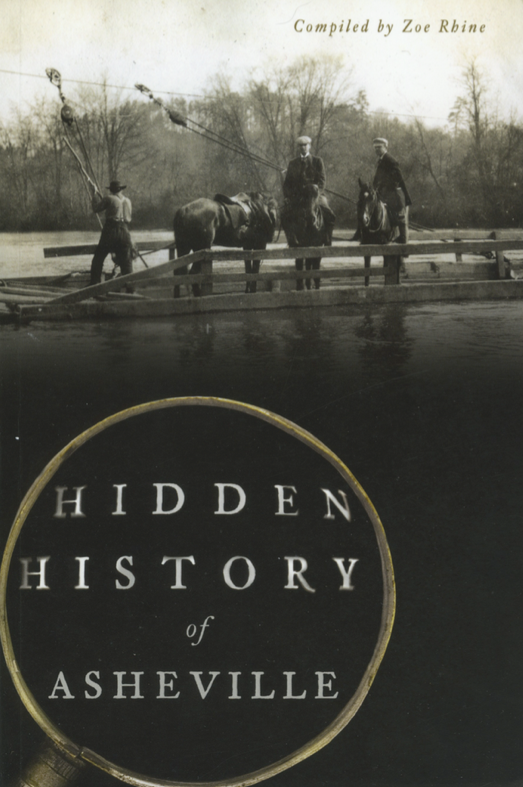When former Asheville Mayor Gallatin Roberts committed suicide on Feb. 25, 1931, he had no reason to think that 88 years later a retired Buncombe County assistant librarian would tear up while discussing his life and its tragic end.
“I knew I was going to cry,” says Betsy Murray. “I get real emotional about this.”
Murray’s deep sense of connection to Roberts developed long after his death. In 2013, just two years before her retirement, she and her colleagues at the North Carolina Room at Pack Library received an unexpected historical mother lode. Linda Burgin, the deceased mayor’s granddaughter, donated photographs, letters, diaries and scrapbooks belonging to him that had languished in an old trunk.
But the item that most caught Murray’s eye was Roberts’ handwritten memoir, which she transcribed for the library’s digital records. “I was so immersed in it that I felt like I really knew him,” she reveals.
Around the same time, fellow staffer Zoe Rhine launched the library’s blog, HeardTell, whose mission is to spotlight and share the room’s ever-growing archival collection. Murray soon became a regular contributor; one of her posts, “A Stolen Suit and the Fickle Finger of Fate,” tells Roberts’ sad story.
More recently, Rhine has spearheaded a project to compile a book out of the blog’s most popular posts, including Murray’s piece on Roberts. On Wednesday, July 31, the North Carolina Room will host the official launch party, celebrating the publication of Hidden History of Asheville. The book, which is part of The History Press’ Hidden History series, includes photographs to complement the historical accounts. All proceeds from its sale will benefit the North Carolina Room.
By the community, for the community
Although history sits at the center (and in the title) of the collection, the publication is far more than just a history book, says Rhine. She hopes its focus on the city’s unsung heroes will send readers the message that “anyone can make a difference in the place where they live.”
Particularly in Asheville, she continues, “There is just a lot of room for people to make a difference and do the kind of work that they consider important.”
The book itself is a testament to this, notes Rhine. Because of the North Carolina Room’s small staff (there are only two full-time employees), the project relied heavily on the help of volunteers and members of the Friends of the North Carolina Room. From writing to editing, researching to organizing, the book could not have come about without this team effort, says Rhine.
The project’s collaborative nature also ensured that it covered a variety of topics, including Asheville’s early immigrants, former slaves and lost communities.
“Our goal is not to write about the people who are always written about,” stresses Rhine. “There are enough accounts of Vanderbilt, Pack and Grove. … We’re interested in looking at the everyday people who have come and gone in Asheville.”
Murray underscores the point. “You don’t have to be famous to be important,” she points out, and that message lies at the heart of Hidden History: Everyone’s story contributes to an area’s development in some way, but none of it can be unlocked if the material is thrown away.
“The North Carolina Room will take things in any shape and do what they can to make sense of it,” she explains. Of course, dated and labeled photographs and documents are ideal. But whatever the condition, Murray urges residents to think about what they’ve got stored away inside their homes and consider donating it to the library’s special collections.
Whether it’s a trunk’s worth of treasures or just a few personal letters, acquisitions of all sizes are accepted at the North Carolina Room — and, in some cases, celebrated within the pages of Hidden History. “That’s another important thing that the book does,” says Rhine. “It shows the public that we don’t just leave their archives sitting on the shelf: We try and bring them back to the community and make them relevant to today. I think that’s an important component of what we do.”
‘Automatic liar’
Besides uncovering forgotten events, residents and anecdotes, Hidden History also captures some of the personalities and absurdities that populated the city’s past. Two of the book’s funniest chapters come courtesy of retired head librarian Laura Gaskin.

The first one chronicles the 1909 installation of a weather kiosk on Pack Square. Part of a nationwide initiative led by the U.S. Weather Bureau (now the National Weather Service), the meteorological instrument was initially met with excitement by residents — until, that is, it began reporting summer temperatures far higher than what local businesses were promoting to tourists.
Like many of the book’s contributors, Gaskin used contemporary newspaper reports as part of her research. In this particular chapter, headlines expose the rising tension between the world of science and the city’s marketing strategy. In a mad dash to change the narrative, for example, an Aug. 30, 1909, article in The Asheville Citizen declared, “Weather kiosk is an automatic liar.”
Gaskin chronicles similar absurdities in her chapter on a captured German cannon that was gifted to the city by returning soldiers at the end of World War I. At first, residents couldn’t agree on where to display the weapon. For a time it was unceremoniously stashed in the rear of the former courthouse yard before a group of veterans won approval to move it to Pack Square in front of the Vance Monument.
The cannon remained there for nearly three decades before mysteriously vanishing — not once, but twice. The final disappearance was reported in the Asheville Times on Oct. 29, 1942. No one, the paper noted, claimed responsibility. But a note (supposedly written by the cannon) was found at the Pack Square site. “There is another World War on, fellow citizens,” the cannon proclaimed, “and this time I am on your side. I am made of iron and steel and Uncle Sam needs me.”
Both stories, says Gaskin, echo tensions that still exist in Asheville today. The kiosk controversy, she notes, captures the city’s long-standing reliance on the tourism industry. Meanwhile, the cannon anecdote constitutes an earlier version of an ongoing debate: What monuments represent the city and why?
100 years ago today
Although the publication of Hidden History of Asheville is a major feat for the North Carolina Room, Rhine isn’t resting on her laurels. “I’m on to other projects,” the librarian says, mentioning her current research into Asheville’s historical African American businesses.
Still, she and the book’s other contributing writers say they’re excited to see their work go out into the community. Gaskin says her greatest hope is that the publication reiterates two important points: that individual stories matter and that history is always in the making.
“Eventually, ‘the last 10 years’ will become ‘100 years ago today,’” she points out. “So what we’re doing now does matter and will continue to matter as time goes on. What we’re doing now leads to the next thing.”
WHAT: Hidden History of Asheville launch party
WHERE: North Carolina Room at Pack Library, 67 Haywood St., avl.mx/6b4
WHEN: Wednesday, July 31, 6-7 p.m. Free





Before you comment
The comments section is here to provide a platform for civil dialogue on the issues we face together as a local community. Xpress is committed to offering this platform for all voices, but when the tone of the discussion gets nasty or strays off topic, we believe many people choose not to participate. Xpress editors are determined to moderate comments to ensure a constructive interchange is maintained. All comments judged not to be in keeping with the spirit of civil discourse will be removed and repeat violators will be banned. See here for our terms of service. Thank you for being part of this effort to promote respectful discussion.